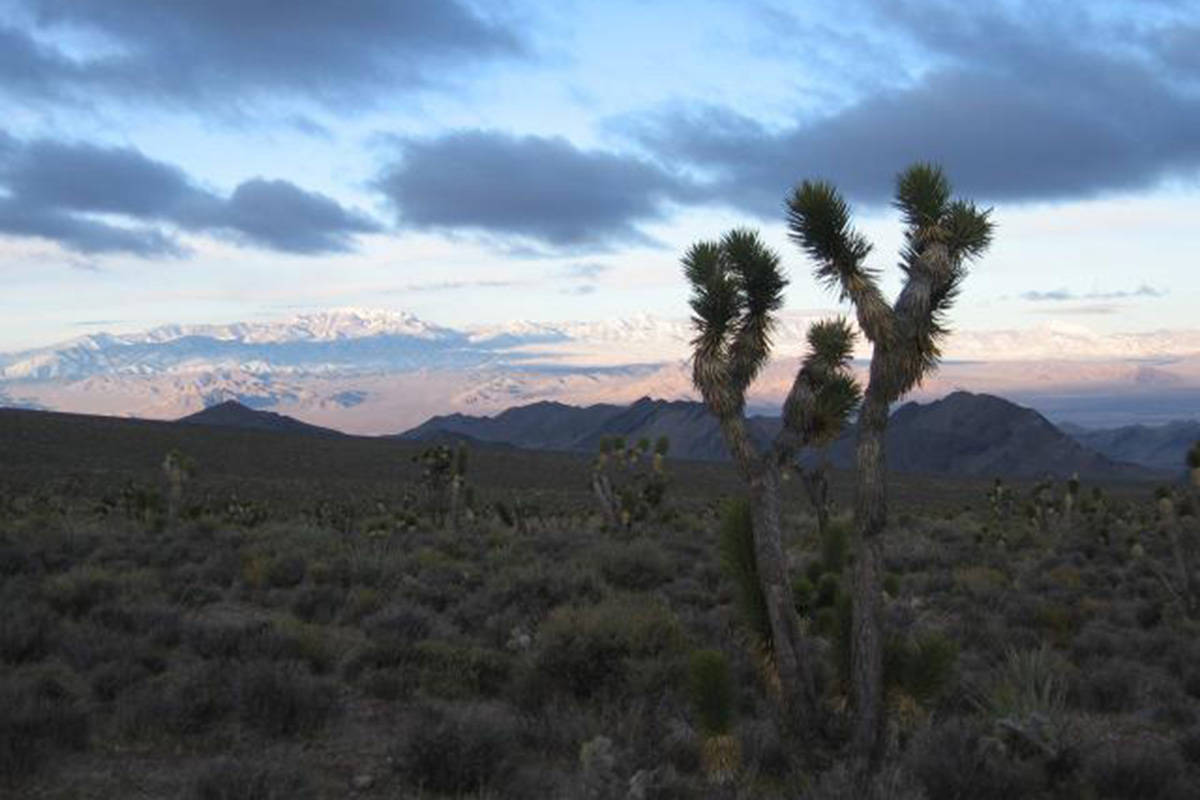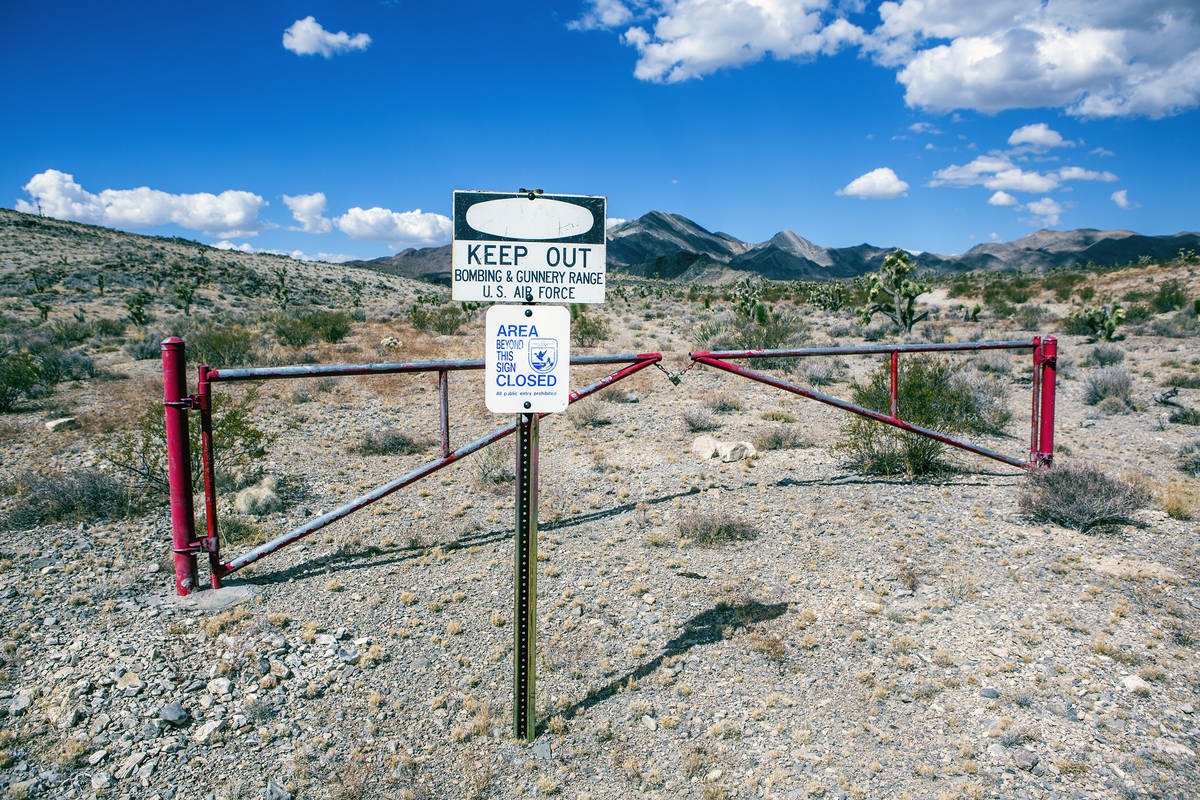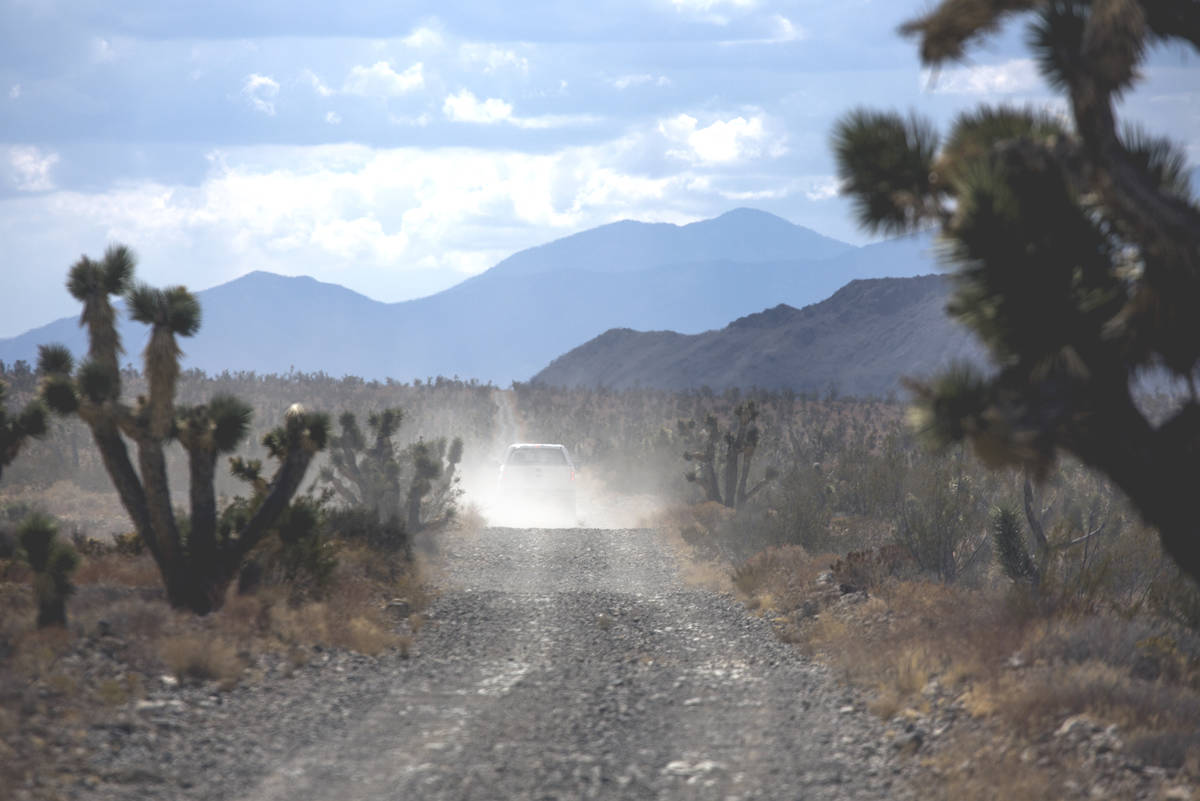CHUCK BAKER: Debate with military for Nevada lands continues
Nellis Air Force Base
As a young boy I was always confused when I heard the old saying, “Buy land. They ain’t making it any more!” Later on I understood what it meant, but I still don’t always agree with it.
To begin with, there are many examples of swamps being filled in and used constructively, thereby “making” more land. And while I’m not condoning it when rain forests and jungles are destroyed in order to develop buildings and roads, the fact is it does occur. And then there are tried and true redevelopment projects — tearing down the old and constructing newer, bigger, and sometimes better edifices. All involve “making” more land.
Nevada’s land is unique in many distinctive ways. So much so that with a little imagination, it is possible to make more of it. For example, for years Boulder City maintained strict control over its city limits and only allowed a handful of homes to be built. But recently the city fathers approved legislation and allowed two brand new housing developments to spring up. And while the Bureau of Land Management tightly controls thousands of acres, that agency can also be unique. They’re stingy, but they do allow a few parcels to shake loose from time to time. And then there is Nellis Air Force Base and other military establishments within the state. The uniqueness that happens within the military is somewhat different — because for the most part, when the military makes new land, it’s generally not for the populace at large. It wants the soil for itself.
Journalist William Atkins, after reviewing author Ben Ehrenreich’s volume “Desert Notebooks” in the New York Times, described the Nevada landscape as “silent, static and skeletal.” He added that part of the desert’s appeal is that it has “always been a symbol of death.” True, the Air Force uses much of its land (but definitely not all) as a bombing range, flying vintage but usable aircraft through paces as weapons of war. And of course the skies also are filled with brand new multimillion dollar aircraft that are developed to keep up with militaristic nations that could pose problems for the U.S. When those new planes roll off the assembly line, the government often says it requires more space to test them, to observe pilots maneuvering the machines over the clouds at high speeds, while dropping destructive bombs into the sand and cacti and rocks below. However, the current proposal for expansion of land does not include any provisions for use of weapons or instruments of war. According to the Air Force, the land is to be used for training exercises other than those using firepower. But conservationists and politicians and concerned citizens are nonetheless waging their own war against the Department of Defense. They feel the government has enough of Silver State land, and the public should be able to keep all of nature’s refuges it currently uses for enjoyment. If anyone deserves more land, it’s the people, they say.
Garett Reppenhagen is the executive director of Veterans for Peace. He recently contributed an op-ed in a Las Vegas newspaper claiming that a recent Department of Defense plan to cut off public access to parts of the Desert National Wildlife Refuge is uncalled for. He writes that he is a veteran of the Army’s First Infantry Division and served in Iraq, and found beauty in that country’s landscape. Returning home, he writes that he and other veterans find solace immersing themselves into the American wilderness.
As a Vietnam War veteran who served in the same Army division years earlier, I can appreciate his stance. Yet I also realize that in today’s world, national defense has never been more urgent. And while I know little about Veterans for Peace, through the web I contacted the organization’s membership coordinator, Casey Stinemetz, asking if there are any chapters in Nevada. He replied that while there are “many members throughout the state,” there are no active chapters here.
Part of Reppenhagen’s writing states that the current 800,000-acre refuge is home to many of nature’s wonders, including bighorn sheep and other animals, and the government’s action would deny local tribes of indigenous peoples’ access to cultural lands. During the past few years, in other expansions of land by the Air Force that I have reported on, tribes have in fact complained about taking of ancestral lands by the government. However, this time the House Armed Services Committee is going through Congress seeking to take the acreage in question. Although Congress represents the people, Veterans for Peace is upset that Nevadans have supposedly not been directly consulted.
While not an official spokesman for the Air Force concerning this particular land situation, Las Vegan David Radcliffe is president of the Nellis Support Team, a sanctioned longtime volunteer organization that supports airmen serving at Nellis. He is also an active member in the National Defense Industrial Association, which describes itself as driving strategic dialogue in national security. It reports it identifies key issues and leverages the knowledge and experience of its military, government, industry and academic members to address those issues. Moreover, it claims some 70,000 individual members and 1,650 corporate members. He takes issue with Reppenhagen’s comments. Concerning the refuge property, he said, “Public access is allowed and will continue to be allowed.” In addition, there will be “Zero new bombing ranges or weapons impact areas in the proposal.” And he claims that Nevada citizens including indigenous peoples were in fact “offered numerous opportunities to give input (and) comments on the proposal.” He said that several comments were made and included in the proposal that “worked its way through the Department of Defense to the Office of Management and Budget and ultimately to the House and Senate as a legislative proposal for FY 2021.” Further, he points out that there is “an entire annex in the proposal that was written by the tribes.” Radcliffe further states that members of the Nevada congressional delegation have copies of all the above documents.
They may well have copies, but there is strong feedback by the members when it comes to public land in general. A proposed $740 billion defense bill from the Senate excludes the transfer of public lands in Nevada for military training by the Air Force and Navy. Also excluded were items that would expand training into public, private and tribal lands by the Fallon Naval Air Station into the Desert National Wildlife Refuge. Attempts to include the land in the defense bill were blocked by Nevada Rep. Steven Horsford, D-Nev., and supported by Rep. Dina Titus and Rep. Susie Lee, both Nevada Democrats. Rep. Mark Amodei, R-Nev., voted against the bill in the House. But in news reports he was quoted as saying he hoped that the military and tribal leaders could come up with a workable compromise solution that would expand the Fallon property.
In related actions showing solidarity in their efforts to promote statewide conservation, Nevada Democratic Sens. Jackie Rosen and Catherine Cortez Masto in June introduced the Carson City Public Land Correction Act. They reported the legislation “would promote conservation, improve public lands management and expand economic development opportunities in Carson City. The act authorizes land to be used for future residential areas, while allowing for proceeds of the land sales to go toward conservation efforts to protect outdoor spaces. Later in the month Rosen celebrated Senate passage of the Great American Outdoors Act that she helped introduce. In a prepared statement, Rosen said in part, “This landmark bill will help ensure public lands in Nevada and across the country remain protected for future generations.” The bill builds upon previously introduced legislation providing funds for land and water conservation, for the National Park Service, the Forest Service, the U.S. Fish and Wildlife Service, the Bureau of Land Management and the Bureau of Indian Education Schools.
Chuck N. Baker is a combat-wounded veteran of the Vietnam War, a recipient of the Purple Heart and a Nevada journalist and author who frequently writes about veterans and military issues.



















